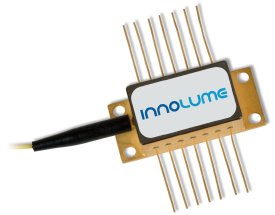Innolume, the leading provider of Quantum Dot (QD) diode lasers covering the 1064 nm to 1320 nm spectrum, today announced that it has begun sampling the LD-12xx-series laser platform, a new generation of pump laser that is based on the company's proprietary Quantum Dot epitaxial technology.
Designed as a pump source for O-band Raman amplification, the LD-12xx-series features a single mode output of 300 mW at 1100 mA, centered at 1240 nm or 1260 nm. Packaged in a 14-pin butterfly, the laser is optionally equipped with a polarization maintaining fiber (PMF) as well as a fiber Bragg grating (FBG) to achieve high stability of output power and spectrum.

Large-scale fiber deployments of access networks are underway worldwide. Passive Optical Network (PON) technologies play an important part in meeting the subscribers' increasing demand for high bandwidth services. The current GPON standard, G.984.2 Amd1, with 28 dB loss budget limits 1:32 split GPON deployments to around 20 km reach. Compared to electrically powered extender boxes, a full passive solution is an attractive technology as discussed at the recent OFC exhibition in San Diego (see "Economic Study Comparing Raman Extended GPON and Mid-span GPON Reach Extender" D. Nesset et al., 2010).
"Pilot customers have demonstrated a 13.3 dB increase in the upstream loss budget of a commercial GPON system operating over >50 km of fiber with a 1:32 PON split," says Guido Vogel, VP of Business Development at Innolume. "O-Band Raman Amplification is an excellent example of how the unique features of Quantum Dot lasers enable new commercial applications. It has been discussed for a long time but never commercially realized due to the absence of low-cost pump lasers in the 12xx nm range. Deployment of distributed Raman-amplified GPON technology based on our LD-12xx-series lasers will offer network operators the option to extend network reach while saving on CAPEX and OPEX. Installing the amplifier unit at the Central Office significantly reduces maintenance costs versus powered extender boxes in the field, which are generally impractical, particularly for rural deployments."
"Our epitaxial growth technology enables high efficiency GaAs-based pump lasers at any desired wavelength in the previously uncovered 12xx nm window, " says Dr. Daniil Livshits, VP of Technology at Innolume. "But our excellent accelerated lifetime test results, conducted internally and at our customers' facilities, demonstrate an even more outstanding feature of these pumps, making them a compelling component for access network and PON-type applications."